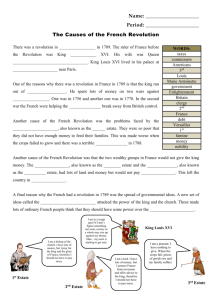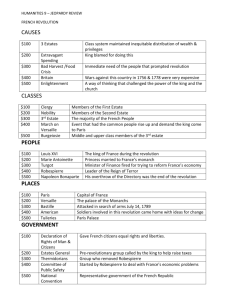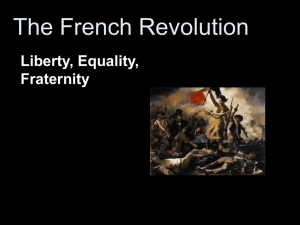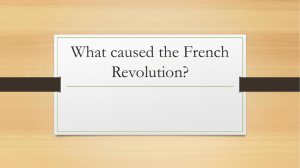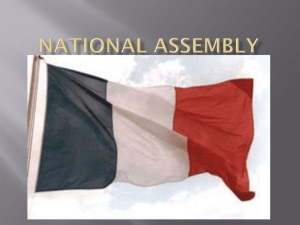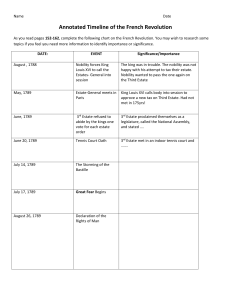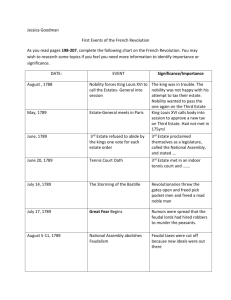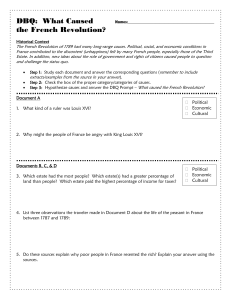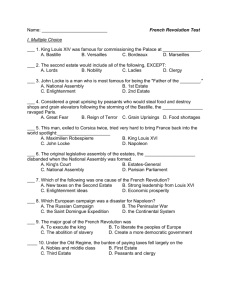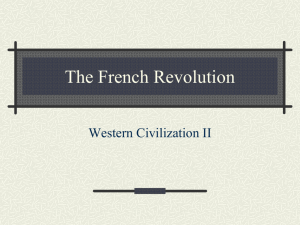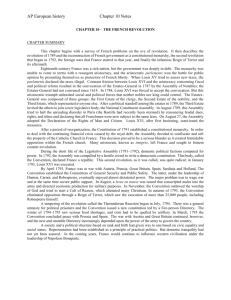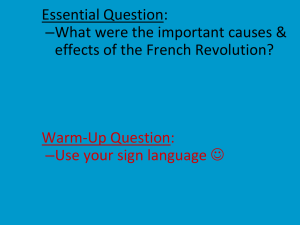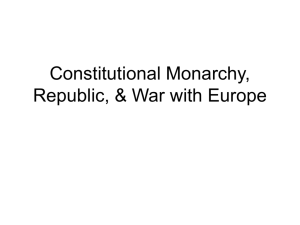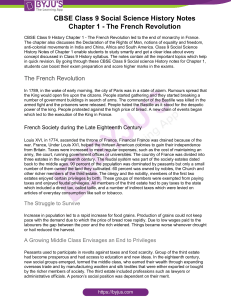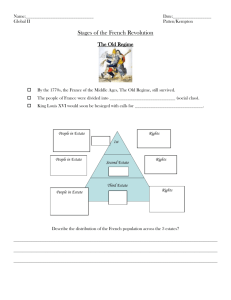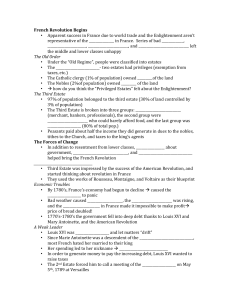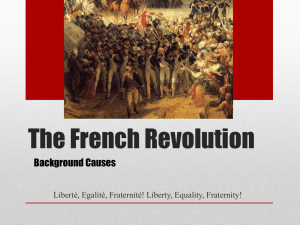I. French Revolution (1789-1815) A. Origins: Old Regime – the
advertisement
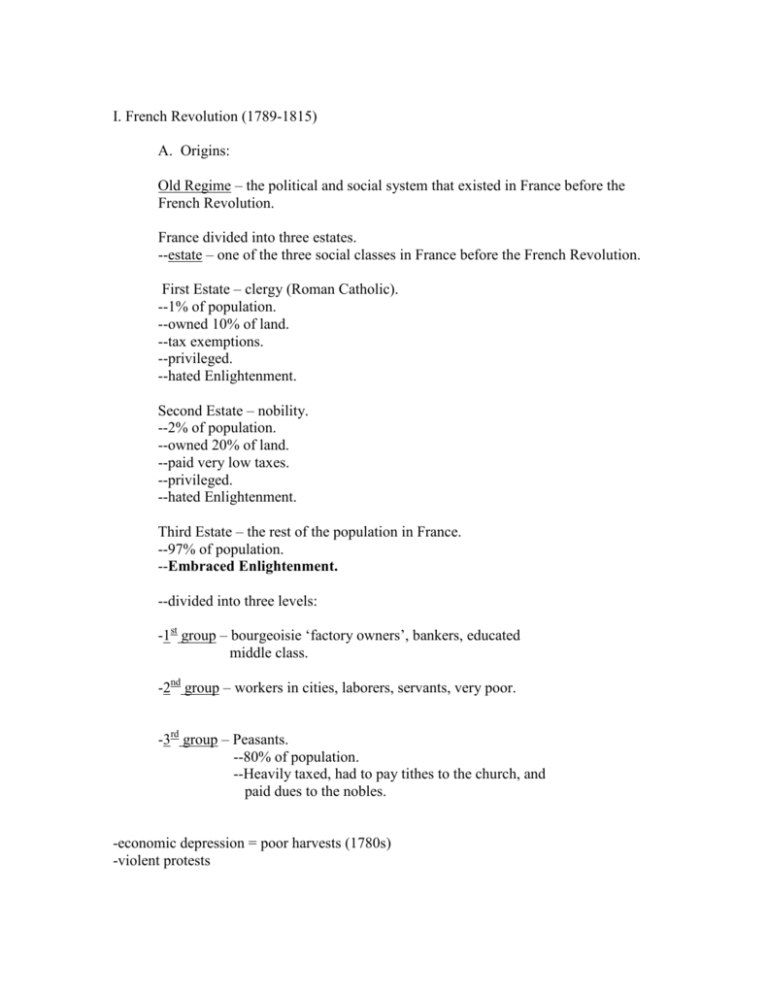
I. French Revolution (1789-1815) A. Origins: Old Regime – the political and social system that existed in France before the French Revolution. France divided into three estates. --estate – one of the three social classes in France before the French Revolution. First Estate – clergy (Roman Catholic). --1% of population. --owned 10% of land. --tax exemptions. --privileged. --hated Enlightenment. Second Estate – nobility. --2% of population. --owned 20% of land. --paid very low taxes. --privileged. --hated Enlightenment. Third Estate – the rest of the population in France. --97% of population. --Embraced Enlightenment. --divided into three levels: -1st group – bourgeoisie ‘factory owners’, bankers, educated middle class. -2nd group – workers in cities, laborers, servants, very poor. -3rd group – Peasants. --80% of population. --Heavily taxed, had to pay tithes to the church, and paid dues to the nobles. -economic depression = poor harvests (1780s) -violent protests 1700s: many wars = France heavily in debt Members of the Third Estate were inspired by the Enlightenment. -Also, they were inspired by the American Revolution (1775-1783). People of the Third Estate had high-burdensome taxes. Cost of living jumped very high. Poor harvests (1780s) Price of bread doubled in 1789. Bread was a staple. King Louis XVI and Queen Marie Antoinette’s extravagant spending on foreign policy brought France to financial crisis. -Declared war on England. -Allied with Americans during American Revolution. -Estates-General – an assembly of representatives from all three estates, or social classes, in France. -Held meeting: May 5, 1789. National Assembly – a French Congress established by representatives of the Third Estate on June 17, 1789, to enact laws and reforms in the name of the French people. -End of absolute monarchy. -Tennis Court Oath – a pledge made by the members of the National Assembly on June 20, 1789, in which they vowed to continue meeting until they had drawn up a new constitution July 14, 1789: Bastille Day. -People stormed the Bastille. Great Fear – a wave of senseless panic that spread through the French countryside after the storming of the Bastille. Declaration of the Rights of Man and of the Citizen (August 26, 1789). -Strengthened the National Assembly with the King -More sweeping language than the American Declaration of Independence. -Emphasized freedom and equal rights. -Representative Government Parisian market women marched on Versailles and captured the King and his family “Bread Riots” -National Assembly took church’s land and power. Made priests state officials (elected). King Louis XVI and Queen Marie Antoinette tried to escape France, but was caught and brought back to Paris (June 1791). National Assembly created Constitution (September 1791). Limited constitutional monarchy. Legislative Assembly – a French Congress with the power to create laws and approve declarations of war, established by the Constitution in 1791. Factions in the Legislative Assembly. Radicals – opposed monarchy and change everything (sat on left side of the hall). Moderates – wanted some change (sat in the middle of the hall). Conservatives – uphold limited constitutional monarchy and few changes (sat on right side of the hall). National Assembly: France declared war on Austria and Prussia (April 1792). Austrian and Prussian monarchs wanted King Louis XVI restored to power. Prussia invaded France. -The French mob captured King Louis XVI and his family. -September Massacres (1792) – angry citizens in France murdering and killing anyone associated with the “haves”. National Convention (new government body) – declared France a republic. Jacobins – well-disciplined radical minority group. Major Leader = Jean-Paul Marat. Girondins – political faction in France. Brilliant advocates. National Convention sentenced King Louis XVI to death for treason. guillotine – a machine for beheading people, used as a means of execution during the French Revolution. Maximilien Robespierre (Jacobin Leader) wanted to make France “a republic of virtue”. Changed everything in France. Ex. No Sundays in Calendar. Became dictator-like. “Reign of Terror”. Leader of Committee of Public Safety. Ironically, approximately 85% of the people guillotined in France were members of the former Third Estate. National Convention executed Maximilian Robespierre (July 28, 1794) Formed new government (1795) Assigned new General to command France: Napoleon Bonaparte.
